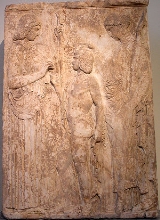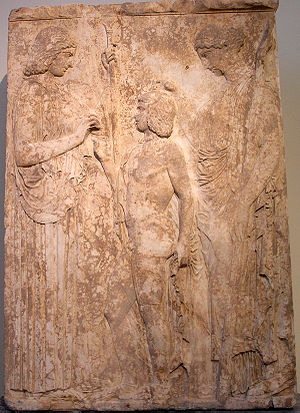
Triptolemus
Encyclopedia

Buzyges (butterfly)
Buzyges is a genus of skippers in the family Hesperiidae.-References:*...
.
Triptolemus , in Greek mythology
Greek mythology
Greek mythology is the body of myths and legends belonging to the ancient Greeks, concerning their gods and heroes, the nature of the world, and the origins and significance of their own cult and ritual practices. They were a part of religion in ancient Greece...
always connected with Demeter
Demeter
In Greek mythology, Demeter is the goddess of the harvest, who presided over grains, the fertility of the earth, and the seasons . Her common surnames are Sito as the giver of food or corn/grain and Thesmophoros as a mark of the civilized existence of agricultural society...
of the Eleusinian Mysteries
Eleusinian Mysteries
The Eleusinian Mysteries were initiation ceremonies held every year for the cult of Demeter and Persephone based at Eleusis in ancient Greece. Of all the mysteries celebrated in ancient times, these were held to be the ones of greatest importance...
, might be accounted the son of King Celeus
Celeus
Celeus or Keleus was the king of Eleusis in Greek mythology, husband of Metaneira and father of several daughters, who are called Callidice, Demo, Cleisidice and Callithoe in the Homeric Hymn to Demeter, and Diogeneia, Pammerope and Saesara by Pausanias.In the Homeric Hymn to Demeter, Celeus was...
of Eleusis in Attica, or, according to the Pseudo-Apollodorus (Bibliotheca
Bibliotheca (Pseudo-Apollodorus)
The Bibliotheca , in three books, provides a comprehensive summary of traditional Greek mythology and heroic legends, "the most valuable mythographical work that has come down from ancient times," Aubrey Diller observed, whose "stultifying purpose" was neatly expressed in the epigram noted by...
I.V.2), the son of Gaia
Gaia (mythology)
Gaia was the primordial Earth-goddess in ancient Greek religion. Gaia was the great mother of all: the heavenly gods and Titans were descended from her union with Uranus , the sea-gods from her union with Pontus , the Giants from her mating with Tartarus and mortal creatures were sprung or born...
and Oceanus
Oceanus
Oceanus ; , Ōkeanós) was a pseudo-geographical feature in classical antiquity, believed by the ancient Greeks and Romans to be the world-ocean, an enormous river encircling the world....
—another way of saying he was "primordial man".
While Demeter
Demeter
In Greek mythology, Demeter is the goddess of the harvest, who presided over grains, the fertility of the earth, and the seasons . Her common surnames are Sito as the giver of food or corn/grain and Thesmophoros as a mark of the civilized existence of agricultural society...
was searching for her daughter, having taken the form of an old woman called Doso, she received a hospitable welcome from Celeus. He asked her to nurse Demophon
Demophon of Eleusis
In Greek mythology, Demophon sometimes written in English as Demophoon, was a son of King Celeus and Queen Metanira. While Demeter was searching for her daughter Persephone, having taken the form of an old woman called Doso, she received a hospitable welcome from Celeus, the King of Eleusis in...
—"killer of men", a counterpart to Triptolemus— and Triptolemus, his sons by Metanira
Metanira
In Greek mythology, Metanira was a queen of Eleusis and wife of Celeus. While Demeter was searching for her daughter, having taken the form of an old woman called Doso, she received a hospitable welcome from Celeus, the King of Eleusis in Attica. He asked her to nurse Demophon, his son by Metanira...
. As a gift to Celeus, because of his hospitality, Demeter planned to make Demophon immortal by burning away his mortal spirit in the family hearth every night. She was unable to complete the ritual because Metanira walked in on her one night. Instead, Demeter chose to teach Triptolemus the art of agriculture and, from him, the rest of Greece learned to plant and reap crops. He flew across the land on a winged chariot while Demeter and Persephone
Persephone
In Greek mythology, Persephone , also called Kore , is the daughter of Zeus and the harvest-goddess Demeter, and queen of the underworld; she was abducted by Hades, the god-king of the underworld....
cared for him, and helped him complete his mission of educating the whole of Greece in the art of agriculture.
When Triptolemus taught Lyncus
Lyncus
In Greek mythology, King Lyncus of the Scythians was taught the arts of agriculture by Triptolemus but he refused to teach it to his people and then tried to kill Triptolemus. Demeter turned him into a lynx...
, King of the Scythia
Scythia
In antiquity, Scythian or Scyths were terms used by the Greeks to refer to certain Iranian groups of horse-riding nomadic pastoralists who dwelt on the Pontic-Caspian steppe...
ns, the arts of agriculture, Lyncus refused to teach it to his people and then tried to kill Triptolemus. Demeter turned him into a lynx
Lynx
A lynx is any of the four Lynx genus species of medium-sized wildcats. The name "lynx" originated in Middle English via Latin from Greek word "λύγξ", derived from the Indo-European root "*leuk-", meaning "light, brightness", in reference to the luminescence of its reflective eyes...
. Triptolemus was equally associated with the bestowal of hope for the afterlife associated with the expansion of the Eleusinian Mysteries (Kerenyi 1967 p 123).
In the archaic Homeric Hymn to Demeter, Triptolemus is briefly mentioned as one of the original priests of Demeter, one of the first men to learn the secret rites and mysteries of Eleusinian Mysteries
Eleusinian Mysteries
The Eleusinian Mysteries were initiation ceremonies held every year for the cult of Demeter and Persephone based at Eleusis in ancient Greece. Of all the mysteries celebrated in ancient times, these were held to be the ones of greatest importance...
: Diocles
Diocles
Diocles may refer to:*Diocles, a person in Greek mythology*Roman emperor Diocletian, formerly named Diocles*Diocles of Carystus, Greek physician who lived 4th century BC*Diocles , 2nd century BC and the beginning of the 1st century BC...
, Eumolpos, Celeus
Celeus
Celeus or Keleus was the king of Eleusis in Greek mythology, husband of Metaneira and father of several daughters, who are called Callidice, Demo, Cleisidice and Callithoe in the Homeric Hymn to Demeter, and Diogeneia, Pammerope and Saesara by Pausanias.In the Homeric Hymn to Demeter, Celeus was...
and Polyxeinus were the others mentioned of the first priests. The role of Triptolemus in the Eleusinian mysteries was exactly defined: "he had a cult of his own, apart from the Mysteries. One entered his temple on the way to the closed-off sacred precinct, before coming to the former Hekataion, the temple of Artemis
Artemis
Artemis was one of the most widely venerated of the Ancient Greek deities. Her Roman equivalent is Diana. Some scholars believe that the name and indeed the goddess herself was originally pre-Greek. Homer refers to her as Artemis Agrotera, Potnia Theron: "Artemis of the wildland, Mistress of Animals"...
outside the great Propylaia." (Kerenyi). In the 5th-century bas-relief in the National Museum, Athens (illustration), which probably came from his temple, the boy Triptolemus stands between the Two Goddesses, Demeter and the Kore
Persephone
In Greek mythology, Persephone , also called Kore , is the daughter of Zeus and the harvest-goddess Demeter, and queen of the underworld; she was abducted by Hades, the god-king of the underworld....
, and receives from Demeter the ear of grain (of gold, now lost).
Porphyry
Porphyry (philosopher)
Porphyry of Tyre , Porphyrios, AD 234–c. 305) was a Neoplatonic philosopher who was born in Tyre. He edited and published the Enneads, the only collection of the work of his teacher Plotinus. He also wrote many works himself on a wide variety of topics...
(On Abstinence IV.22) ascribes to Triptolemus three commandments for a simple, pious life: "Honor your parents", "Honor the gods with fruits"—for the Greeks, "fruits" would include the grain—and "Spare the animals" (Kerenyi, p128).
Triptolemus is also depicted as a young man with a branch or diadem placed in his hair, usually sitting on his winged chariot, adorned with serpents
Serpent (symbolism)
Serpent in Latin means: Rory Collins :&, in turn, from the Biblical Hebrew word of: "saraf" with root letters of: which refers to something burning-as, the pain of poisonous snake's bite was likened to internal burning.This word is commonly used in a specifically mythic or religious context,...
. His attributes include a plate of grain, a pair of wheat or barley ears and a scepter.
Celeus or the peasant Dysaules may be substituted for Triptolemus as the primordial Eleusinian recipient of the first gifts of the Mysteries.

